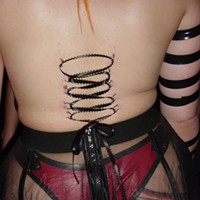Elizabeth McLaren, for all her unmistakable feminine characteristics -- the clothes, make-up, voice and mannerisms -- was, at least technically, born a male. Take a blood sample and you'll find the XY chromosome designation of the male gender. But everything else about him, or her, rather, is female, and it's uncanny. I had a good hour to observe Elizabeth during our interview, and other than a vaguely squared jaw, everything about her is effortlessly feminine.
"Spiritually, psychologically and mentally, I'm a woman," McLaren says. "I'm not gay because I like boys. I like boys because I have an internal feminine gender."
If it sounds complicated trying to explain it, imagine having to live it. While there's a bit of drama concerning labels, "transgender" refers to a person whose mental perception of their own gender is inconsistent with their physical body and/or sex (a condition known as "gender dysphoria"). A "transsexual" is someone whose feelings of gender dysphoria are more extreme, and gender transition (hormones, surgery, etc.) is a mental health necessity. Elizabeth falls into the latter category.
Although there is no proven or wholly accepted theory of the cause of gender dysphoria, several prominent notions exist. Many studies lean toward the idea that something happens on a chemical or genetic level in the womb, resulting in the individual being born with the condition. Another theory posits that it is caused by a traumatic experience during a child's "identification process."
"From infancy on, we are involved in a psychological process of identifying with the same gender parent," said Dr. John Wheeler, a psychologist and certified sex therapist with the Mecklenburg Psychological Group. "This theory states that during the identification process, something happens that damages one's sense of self to the degree that he or she identifies with the parent of the opposite sex, and takes on those behaviors, attitudes and attributes."
Whatever the cause, sexual dysphoria is recognized as a legitimate and diagnosed disorder. The Harry Benjamin Standards of Care were issued in 1979 to help guide doctors in treating people who have gender dysphoria. Those standards, says Dr. Wheeler, are complex and usually long term.
As one might imagine, feeling as if Mother Nature outfitted you with the wrong body and sex organs would be a traumatic and extraordinarily stressful experience. Now imagine wrestling with those issues while at the same time dealing with the social and cultural pressures of school, family, dating, sexuality, and the workplace. Only then can you get an inkling of what those who are transgender contend with.
Elizabeth doesn't have to imagine. Elizabeth was originally Travis, born 20 years ago in Rock Hill. From the very beginning, young Travis acted and felt like a girl. These feminine instincts and tendencies soon ran head-on with the expected gender role and behavioral traits of a little boy.
"From the time I was five and going to kindergarten I realized I was attracted to boys," Elizabeth said. "I never had an interest in sports or playing with things like trucks and army men. My father didn't spend much time with me because I don't think he knew how to handle me. He was almost ashamed. I was going to church every Sunday with my mother, and I was already getting the message that being attracted to another male was very wrong."
Things only got worse once Travis entered grade school. "It was absolutely terrible. I had the terms fag and sissy pinned on me in third grade. From then on, I was alienated, ostracized and bullied. I was my own island. As I got older, my feminine personality only asserted itself further. When I looked in the mirror I saw a girl."
Confused and ashamed, Travis withdrew. On the rare occasions when he tried to reach out to others, or act on romantic feelings, he was rebuffed.
"Unrequited love is a huge part of being trans," Elizabeth said. As the depression and isolation grew worse, Travis began to gain weight. "After being called a fag all day long I would come home and gorge myself." Travis eventually gained over 200 pounds, which caused his self-esteem to plummet even further, making him more of a target for ridicule. The teasing got so bad, his mother came to his school one day and confronted several of the bullying students. This led to a physical confrontation in the parking lot with one of the students' mothers, and the police were called.
"It was very Jerry Springer," Elizabeth said.
Just when it looked like things couldn't get any worse, when Travis was in ninth grade his father was killed in a car accident. "I used that as a way to withdraw from school. That just drove me down even further." At 16, Travis finally built up the courage to come out as gay. "After about a week of ranting and raving and throwing herself on the ground, my mom finally accepted it."
Already withdrawn from high school, Travis lived as a hermit for years. But as he turned 18 he was involved in a serious car accident that would forever change his life.
"I realized I could have been killed. I was lying in bed and thinking that if I had died, my mother would have buried me as a fine young man. There was no way in hell I was going to let that happen," says Elizabeth.
At that moment something clicked, and Travis decided it was time to make some serious changes. "I abandoned all masculinity. I let go of that last mental hold, and accepted myself as female."
The next day, Travis cleared out anything from his room that was remotely masculine. However, the transformation was far from complete. "I decided that being fat, short and acned wasn't going to get me anywhere with anybody of any sex. So while I was being a hermit, I started to diet and exercise every day."
This time, Mother Nature was on Travis' side, and he experienced a growth spurt and his skin cleared up. Finally, after about seven months, emerged a six-foot tall, 130-pound beauty. Travis had officially become Elizabeth.
"It was actually very seamless," she explains. "I was already very androgynous. My voice never really dropped. So it didn't take much effort to start dressing as a woman and putting on make-up. But I was still scared to really grasp femininity. I was still dealing with certain physical realities, and I knew people wouldn't understand."
Elizabeth ran away from home when she was 17, and moved to Ft. Lauderdale, FL with a man she met on the Internet. The relationship quickly soured, but Elizabeth soon had other options. "I met this other guy who had a rich Jewish grandmother. He took care of me until I got into my own groove. I encountered a more open and enlightened group of people in Florida, which helped me to further accept my feminine side."
In the fall of 1999, Elizabeth's grandmother died, and when she showed up at the funeral, she did so as a woman. Her first trip back home to South Carolina in several years didn't go very well.
"I had already come out to my grandmother and she totally accepted me," Elizabeth said. "I wanted to go to her funeral exactly as how she knew me."
During the funeral a relative approached Elizabeth and gave her some unwanted advice. "She said 'No, honey, you're just confused. You want to get married to a woman and be a father one day.' And I was like, 'Look at me. I'm wearing a dress and make-up. Do I look like I want to be a father?'"
In mid-2000, Elizabeth left Florida and moved to Chapel Hill. "I had this romanticized idea I could go to North Carolina and basically live in stealth -- no one would know me and I could just start over. I would attend college and become a cheerleader or something. But as a high school dropout, they practically laughed me off campus."
She spent the rest of the year drifting aimlessly in Chapel Hill, spending the last bit of the money she had inherited from her dad. She eventually moved to Charlotte after she met another female trans on-line. Elizabeth is currently sharing an apartment with a friend near SouthPark and attending CPCC. She receives female hormone treatments, and hopes to soon get sex-reassignment surgery, breast implants and laser hair removal. "It's a matter of finding a sugar daddy," she says.
While Elizabeth may casually toss out a flippant statement about finding a sugar daddy to pay for her surgeries, she can also come across as levelheaded and professional. "I'm very schizophrenic in that way," she says.
When asked about her future plans, she talks about moving to Seattle and studying to become a civil liberties attorney. "I want to be an advocate for people who are repressed in any way," she says.
Elizabeth doesn't speak to her family anymore. While she says her life has gotten better, she continues to struggle. She's been diagnosed as chronically depressed, and collects Social Security. "I don't think I'll ever be able to overcome some of the issues from my childhood," she says. "I tend to keep a distance from most people because I'm still afraid of what people will think of me if they knew the truth."
Natural Born Woman
Big boobs, big hair, big lips and a big personality -- Look out Charlotte, it's Tamalah Taylor. You can catch the "seductive and sensational Ms. Tamalah" doing the comic/MC/songstress thing at Sensations, where she uses her voluminous talents to entertain. She's come quite a long way from the little boy who grew up in the tiny, conservative town of Phoenix City, AL.
"I don't remember any gender identities being laid out to me when I was growing up," Tamalah said. "I always thought I was a girl until I went to school and they told me I wasn't. When they called me a boy, I just told them they were mistaken." Tamalah says this with the emphatic little head and neck waddle that only women can truly pull off. "I was picked on at school, but I didn't have this conflicted, tortured childhood. There was never a time when I experimented with 'being straight.' I knew from as early as I can remember that I was a girl. I didn't consider myself gay, I considered myself a heterosexual female."
When Tamalah was 18, her mother took her to the doctor for psychological evaluations. "They were backwoods Alabama people and had no idea what to do with me."
Tamalah's parents then took her to Auburn University for a series of physical tests. "According to the doctor I had XX and XY chromosomes. He said, 'OK this is a bona-fide medical condition, what do you want to do?'"
What Tamalah wanted to do was get sex-reassignment surgery -- in other words, go from an outy to an innie. "It wasn't supposed to be there," Tamalah explained.
She also had female hormone replacement therapy and breast implants. Now, not only did she feel like a woman, she looked like one -- and a bombshell to boot. "It was awesome," she says.
Both before and after the surgery, she presented herself as a woman, and was often asked out by men. "I figured what they didn't know wouldn't hurt them, as long as I didn't sleep with them. I did eventually tell them, but not right off the bat. And knock on wood, every man I ever went out with never had a problem with it. Some were a little freaked, but most were like, hey, let's give this a try."
Tamalah left Alabama when she was 23 and moved to Atlanta. She soon got a job at a place called Lipsticks singing, dancing and doing comedy. She lived in Atlanta for about five years, after which she moved to Raleigh. There she danced and stripped at several clubs, where she said no one suspected she was born a male. She continued stripping at men's clubs after she moved to Charlotte in the mid-90s. Today, the 30-something Tamalah ("You know you don't ask a lady her age") believes she's found her niche at the more "alternative" Sensations. "I love attention, I'm spoiled, and I'm a natural born performer, so I'm doing what I do best. Right now life is pretty great."
Walk Like A Man
Hollis Aiken is a rarity in the already rare world of transsexuals. He was born with female genitalia, but presents and considers himself a man. Only a tiny minority of transsexuals in America is female-to-male (F2Ms).
Hollis is about 5 feet 10 inches tall with broad shoulders and a bit on the hefty side. He has caramel-colored skin, short dreads, a goatee and a slightly rounded face. He's also thoughtful, articulate and deeply spiritual. Although born and raised in New Jersey, the youthful-looking 38-year-old projects a mellow, West Coast vibe. With incense burning, he and his fiancee, Charlene, took a seat on the floor of their small east Charlotte apartment and talked about their relationship, sexuality and growing up as a Jehovah's Witness. Like the other folks interviewed for this story, even as a child Hollis felt as if he had been born the wrong sex.
"Whenever somebody called me 'she,' it just didn't feel right. I wore makeup and dresses because I had to. But it just didn't fit. I thought that maybe some great conversion would happen. If it didn't, I figured I would just be celibate. This is the way I was thinking at 16."
A major influence in Hollis' life during that time was the Jehovah's Witness faith. "It was great for instilling values, but it was very rigid as far as sexuality and gender roles. We weren't allowed to fellowship with people outside the faith. There was no sex before marriage, and you dated only with the intent to marry."
Although Hollis dated a couple of guys growing up, he looked at them more as buddies and role models, not romantic prospects. "There was just no sexual attraction. I didn't understand why my girlfriends were getting so excited about these guys when I was getting excited about the girls."
As Hollis grew older, he learned more about gay lifestyles.
"I was looking at aggressive, 'butch' women, and thought well, I can do this," says Hollis. "And while I was more comfortable than I had been, I still wasn't comfortable within myself. At the time I didn't see any kind of female-to-male role models anywhere. There wasn't anyone experiencing what I was going through."
So on top of all the religious and cultural pressures, Hollis had to contend with feeling different even within the gay and lesbian community. "The conflict was, could I remain in the closet as a lesbian, or did I dare express how deeply I felt about my gender? Even in the gay community I was very much in the minority."
Hollis was still wrestling with this dilemma when he met a woman, ironically enough, in church. At the time, Hollis was still living as a closeted lesbian, and to be carrying on an affair with another woman would have been absolutely scandalous. "We were dealing with the threat of being ex-communicated, of being considered dead by our family and friends."
Despite the risks, the pair started to date secretly. Eventually they moved in together under the ruse of just two good friends sharing rent. But soon the rumors started, followed by the questions from friends and family. Instead of battling all that, the couple packed up and moved to Atlanta.
"That was a very emotional decision," Hollis said. "How do you just cut off people who you've known and worshiped with all your life? But I had felt repressed for a long time. I finally decided it was OK to live my own life. I didn't want to cause my parents any pain, but it was causing me pain to live a lie. I walked away from everything."
Hollis was 28 and it was 1985 when he and his partner arrived in Atlanta. "It was a whole new world in the sense that nobody knew me and I could do whatever I wanted."
Along with this newfound freedom came a sense of independence, and eventually Hollis and his partner went separate ways. Hollis moved back to Jersey where, still living as a lesbian, he continued to date women, but also continued to struggle with feelings of being incomplete.
Then Hollis met Charlene Kinard, again in church, but this time at a more liberal, open-minded congregation where sexuality of all kinds were accepted. At first Hollis resisted Charlene's advances, but eventually the two ended up falling in love and moving in together.
Over the next few years, Hollis slowly began to embrace the idea of living life as a man, and abandoned his feminine side. This included changing his name, using the men's bathroom and buying exclusively men's clothes. About a year ago, looking for a break from the hustle and bustle of New Jersey, Hollis and Charlene moved to Charlotte. In many ways, Hollis is still settling into his new male persona, and says it can be frustrating at times.
"The monthly menstrual thing is a gift that I just didn't want to receive," he said. "And the breasts are a total nuisance. If I could get rid of them today I would. But I also realize that if you don't like the way your world looks you've got to get out there and change it."
Hollis says that as far as medical procedures, he's currently considering breast reduction surgery and hormone replacement treatments to help redistribute some of his body fat and deepen his voice. (Hollis says the goatee he sports is totally natural.) As far as any kind of genital surgery, Hollis is a little reluctant.
"Honestly I'm afraid," he explains. "Charlene and I are still working through what that would mean, and I'm still working on what I'm comfortable with as far as my body and my gender. And bottom line, it's not cheap. But right now I don't really feel pressed to do it. There are prosthetics we can use, so I don't feel like I'm missing anything."
Hollis works in the telecommunications industry, and says that at work he's sometimes still perceived as a woman. "If somebody calls me 'ma'am,' well God bless 'em. I'm not going to stand there and argue. But it does aggravate me. I present myself as a male, and most of the time I'm perceived that way.
"I am very conscious of what I do at times," Hollis continued. "There are some of us who feel pressed to mimic every quality of the stereotypical 'macho man.' But I consider myself more of a gentleman. I don't want to behave in a certain way just because 'it's the way a man would act.' Although at times I do catch myself doing something feminine and it bothers me. Depending on what type of men I'm around, that could be very dangerous. There are times when I have to show the very masculine, 'don't mess with me' part of my personality."
While Hollis continues to wrestle with all these issues, he does have one major hurdle behind him -- he and Charlene recently returned from a trip to New Jersey where he told his family about his decision to live as a man.
"I didn't know if we were going to get tossed out or what," Hollis said. "They already knew I was gay, but this was the first time I told them I was transgender, and that I've felt like a male from birth. My mother didn't try to discount my feelings; she just shared with me her views about what the Bible said. She said that ultimately I have to choose my own way. And for that I'm thankful.
"I'm just trying to live life to the fullest," Hollis continued. "And sometimes that means breaking society's rules. This is not an easy life. I don't live like this to piss people off or stand out. I can either suppress who I am or embrace it. I choose to embrace it."
Contact Sam Boykin at (704) 944-3623 or sam.boykin@cln.com.
Latest in Cover
More by Sam Boykin
-

Divine evolution
Nov 11, 2015 -

The Agony & The Ecstasy
Jun 21, 2012 -

'Dynamite' diet with nutritionist Angela Gallo
Jan 18, 2011 - More »
Calendar
-

Wine & Paint @ Blackfinn Ameripub- Ballantyne
-

Face to Face Foundation Gala @ The Revelry North End
-
An Evening With Phil Rosenthal Of "Somebody Feed Phil" @ Knight Theater
-
Kountry Wayne: The King Of Hearts Tour @ Ovens Auditorium
-

Queen Charlotte Fair @ Route 29 Pavilion
-
Esports in Charlotte Takes Off: A Guide to Virtual Competitions and Betting
-
Canuck in the Queen City 7
A Canadian transplant looks back at her first year as a Charlotte resident
-
Lewis family launches Twelve In Twelve 1
The nonprofit hopes to raise money for 12 organizations around the world and encourage 'voluntourism'












